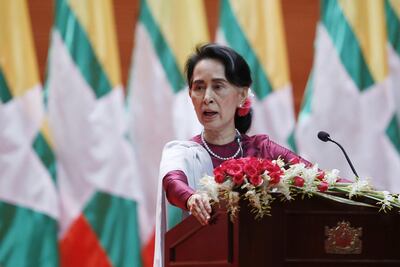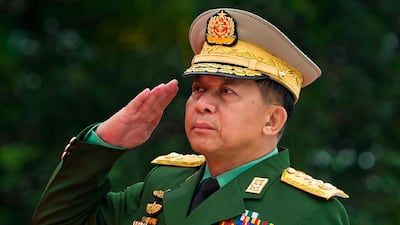Myanmar's army chief said the United Nations had no right to interfere in the country's affairs, a week after a UN investigation called for him and other top generals to be prosecuted for genocide
The actions of General Min Aung Hlaing and other senior officers against Myanmar's Rohingya minority have attracted widespread condemnation.
But his defiant response was the military's first public reaction since a UN fact-finding mission urged the UN Security Council to refer Myanmar's top officers to the International Criminal Court.
It came as the UN General Assembly prepares to discuss the crisis in New York.
No country, organisation or group has the "right to interfere in and make decisions over sovereignty of a country", Gen Min Aung Hlaing told troops in a speech on Sunday, according to the military-run newspaper Myawady.
"Talks to meddle in internal affairs [cause] misunderstanding."
UN investigators went into horrific detail about the atrocities allegedly committed by troops last year in their "clearance operations" against the Rohingya, which forced more than 700,000 of the stateless Muslims to flee over the border into Bangladesh.
Troops, often aided by ethnic Rakhine mobs, committed murder, rape, arson and torture, employing unfathomable levels of violence and with a total disregard for human life, they concluded.
The military has denied all wrongdoing, justifying its crackdown as a legitimate means of rooting out Rohingya militants.

Myanmar's civilian government, led by Aung San Suu Kyi, had already rejected the report's finding as "one-sided" and "flawed" and dismissed a separate decision at the criminal court that found it had jurisdiction over the crisis.
But rights groups and the UN say the operations were vastly disproportionate and a troop build-up in the area occurred before insurgents attacked police posts in August 2017.
_______________
Read our special report on displaced Rohingya Muslims in Cox's Bazaar, Bangladesh:
'I saw them with our women, doing whatever they wanted'
For the Rohingya, now at least, anger stops short of militancy
Rohingya find their voice in exile but not an audience
How the exiled Rohingya and endangered elephants learnt to coexist
_______________
Ms Suu Kyi's civilian government shares power with the still mighty army, which has retained control over a quarter of parliamentary seats and three key ministries since the nation emerged from direct junta-rule in 2011.
The UN team also criticised the Nobel Laureate's government for "acts and omissions" that had "contributed to the commission of atrocity crimes".
In a rare, if understated, criticism of the military, Ms Suu Kyi recently said the situation "could have been handled better".
The army chief made it clear that the Tatmadaw, as the military is known locally, has no intention of extracting itself from politics.
"Take a look at the democracy practices in the world, the countries exercise the democracy system suited to them," the general said, adding that the country must end armed conflict on its road to true multi-party democracy.
"The Tatmadaw will continue its efforts to achieve eternal peace," he said.
The Rohingya languishing in refugee camps in Bangladesh refuse to return to a Myanmar that does not grant them citizenship.
In his speech the army chief doubled down on the narrative widely held in Myanmar that the minority are outsiders, calling them "Bengalis" and insisting that the law which fails to recognise the group among the country's many ethnicities would remain in place.

